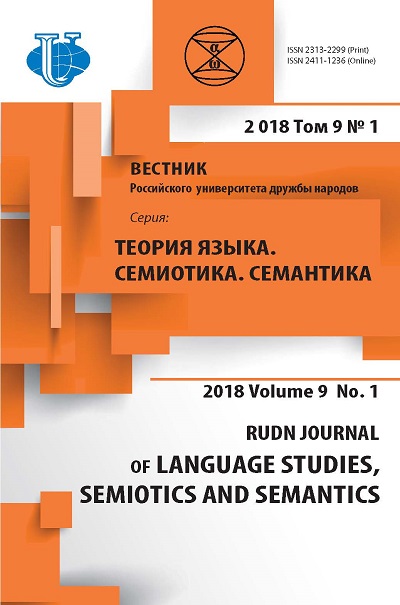Adresata specialization in public political discourse
- Authors: Karasik V.I.1
-
Affiliations:
- Volgograd State Socio-Pedagogical University
- Issue: Vol 9, No 1 (2018)
- Pages: 32-49
- Section: POLITICAL LINGUISTICS
- URL: https://journals.rudn.ru/semiotics-semantics/article/view/18267
- DOI: https://doi.org/10.22363/2313-2299-2018-9-1-32-49
- ID: 18267
Cite item
Full Text
Abstract
The paper deals with public political discourse as presented in official speeches at the UN General Assembly sessions. I argue that main approaches to discourse studies may be defined as analysis of topic, institutional structure, tonality and performative meaning of communication. Three main types of addressees in public political discourse are singled out: general public, basic opponents and professional interpreters. Usually orators emphasize the priorities of humankind when analyzing the world political situation but sometimes they make accent on the problems of their own states or regional interaction. Stylistic and rhetorical format of official presentations at the UN mostly corresponds to norms of diplomatic interaction but sometimes it deliberately deviates from such norms which proves that media discourse with its entertaining techniques gradually infiltrates new areas of communication. Political speech tonality is the most important priority indicator of possible practical actions the world powers may take in their international policy.
About the authors
Vladimir Ilyich Karasik
Volgograd State Socio-Pedagogical University
Author for correspondence.
Email: vkarasik@yandex.ru
Doctor of Philology, Professor, Нead of the Department of theory of English language at the Volgograd State Social and Pedagogical University; scientific interests: sociolinguistics, cultural linguistics, theory of discourse
Lenina pr., 27, Volgograd, Russia, 400066References
- Astafurova, T.N. & Olenic, A.V. (2008). Lingvosemiotika power: sign, word, text. Volgograd: Niva. (In Russ).
- Bazylev, V.N. (1998). To the study of political discourse in Russia and the Russian political discourse the Political discourse in Russia—2: proceedings of the RAB. the meeting. Moscow: Dialogue-MSU. pp. 6—8. (In Russ).
- Balashova, L.V. (2014). The Implementation of the concepts of “friend or foe” in Russian political discourse of the beginning of XXI century, Political linguistics, 1 (47). pp. 40—50. (In Russ).
- Baranov, A.G. (2008). Pragmatics as the methodological perspective of the language. Krasnodar: Prosveschenie-Yug. (In Russ).
- Baranov, A.N. (1997). Political discourse: a farewell to ritual, Man, 6. pp. 108—118. (In Russ).
- Blakar, R.M. (1987). Language as a tool of social power. In Language and modeling of social interaction. M.: Progress. pp. 88—120. (In Russ).
- Budaev, E.V. &, Chudinov, A. P. (2006). Modern political linguistics: teaching aid. Ekaterinburg: Ural State Pedagogical University. (In Russ).
- Wodak. R. (1997). Language. Discourse. Politics / TRANS. from English. and it. Volgograd: Peremena. 139 C. (In Russ).
- Karasik, V.I. (2002). Language circle: personality, concepts, discourse. Volgograd: Peremena. 477 p. (In Russ).
- Karasik, V.I. (2016). Adresata specialization in different types of discourse. In Linguistic processes in the era of globalization: Materials of International scientific seminar (Moscow, 22 December 2016). M.: MGPU. pp. 79—86. (In Russ).
- Kostomarov, V.G. (1994). Language taste of epoch. From observations of speech practice of mass-media. Moscow: Pedagogika-Press. (In Russ).
- Kupina, N. (1995). Totalitarian language: dictionary and speech reaction. Ekaterinburg—Perm: SOUNZ. (In Russ).
- Austin George. (1986). Word as action, New in foreign linguistics. Vol. XVII. The theory of speech acts. M.: Progress. pp. 22—129. (In Russ).
- Popova, E.A. (1995). Cultural and linguistic characteristics of political discourse (on the material of newspaper interviews): [abstract of dissertation]. Volgograd. (In Russ).
- Popov, S.V. (2011). Linguo-cultural type “school teacher”: the subjective positioning: [abstract of dissertation]. Volgograd. (In Russ).
- Searle, J.R. (1986). The classification of illocutionary acts. In New in foreign linguistics. Vol. 17. M.: Progress. pp. 170—194. (In Russ).
- Stepanov, Y.S. (1997). Constants. Dictionary of Russian culture. Study experience. Moscow: School “Russian culture Languages”. (In Russ).
- Filippova, M.A. (2007). Ideological concept of “democracy” (in the linguistic culture of the USA): [abstract of dissertation]. Volgograd. (In Russ).
- Sheigal, E.I. (2004). Semiotics of political discourse. Moscow: Gnosis. (In Russ).
- Bergsdorf, W. (1978). Politik und Sprache. München, Wien: Olzog.
- Bitzer, L.F. (1981). Political Rhetoric. In Handbook of Political Communication. Beverly Hills, London: Sage Publications. pp. 225—248.
- Chilton, P.A. (1994). Politics and Language. In The Encyclopedia of Language and Linguistics, R.E. Asher (ed.). Oxford, New York: Pergamon Press. pp. 3214—3221.
- Denton, R.E.Jr. & Woodward, G.C. (1985). Political Communication in America. New York: Praeger.
- Dieckmann, W. (1969). Sprache in der Politik. Einführung in die Semantik und Pragmatik der politischen Sprache. Heidelberg: C. Winter.
- Dijk, T.A. (1995). Van. Discourse Semantics and Ideology. Discourse and Society, 2. Vol. 6. pp. 243—285.
- Graber, D. (1981). Political Languages. In Handbook of Political Communication. Beverly Hills, London: Sage Publications. pp. 195—224.
- Habermas, J. (1984). The Theory of Communicative Action. Vol.1. Reason and the Rationalization of Society. L.: Heinemann.
- Meadow, R.G. (1980). Politics as Communication. Norwood (New Jersey): Ablex Publ. Co.
- Zimmermann, H.D. (1975). Die politische Rede: Der Sprachgebrauch Bonner Politiker. Stuttgart: Kohlhammer. (In Russ).
Supplementary files












